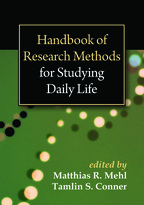Handbook of Research Methods for Studying Daily Life
Edited by Matthias R. Mehl and Tamlin S. Conner
Foreword by Mihaly Csikszentmihalyi
HardcoverPaperbacke-bookprint + e-book
Hardcover
orderOctober 20, 2011
ISBN 9781609187477
Price: $126.00 676 Pages
Size: 7" x 10"
Paperback
orderOctober 15, 2013
ISBN 9781462513055
Price: $84.00676 Pages
Size: 7" x 10"
“Recommended. Upper-division graduates through faculty and professionals.”

—Choice Reviews
“If you want to study life as it is lived—and do it by the numbers—then this volume is for you. This invaluable reference presents the latest theories, methods, and topics, and will provide inspiration and guidance for students and seasoned researchers alike. Mehl and Conner have assembled a team of experts at the forefront of the field who demonstrate that naturalistic sampling methods have developed into powerful tools for studying all facets of the human condition. The chapters have that rare combination of conceptual sophistication and methodological precision, making this book indispensable for anyone who wants to investigate how people feel, think, and behave in the moment-to-moment rhythms of their lives.”

—Lisa Feldman Barrett, PhD, Distinguished Professor of Psychology, Northeastern University
“This volume—more than any other book published in the last two decades—will change the field of psychology. Psychological scientists have long recognized that ultimately, if their research is to have any meaning, they must venture out of the lab to study psychological processes unfolding in the 'real world.' But until now there has not been a comprehensive resource to show them how. As the first complete, authoritative, and practical guide to studying daily life, this handbook is set to change the way research is done. Every behavioral scientist should own a copy.”

—Sam Gosling, PhD, Department of Psychology, The University of Texas at Austin
“This is an excellent and timely work of extraordinary breadth. It is both a primer for those new to daily experience research and a valuable reference for experienced researchers. Coverage ranges from conceptual foundations to applications and statistical methods, with discussions of self-report and objective measures; hardware and software; and research design, execution, and analysis. Rich with practical tips, this is truly a handbook that researchers will want to have close at hand as they navigate this exciting area. The book would serve superbly as a text for a graduate seminar.”

—Saul Shiffman, PhD, Department of Psychology, University of Pittsburgh
“Over the last decades, as researchers focused on increasingly sophisticated but narrow methods and theories, many forgot that human beings live impressively complex lives outside the laboratory. In the real world, emotions, thinking patterns, biological activity, and social relationships are constantly interacting and changing in ways that are poorly understood. Some new sheriffs are in town. This remarkable handbook brings together some of the most innovative research in all of psychology, pointing to new ways of measuring natural behavior across a wide array of contexts. Expertly written and broad in scope, this book heralds a new generation of real-world research that will touch all of us in the years to come.”

—James W. Pennebaker, PhD, Regents Centennial Professor of Psychology, University of Texas at Austin
—Choice Reviews
“If you want to study life as it is lived—and do it by the numbers—then this volume is for you. This invaluable reference presents the latest theories, methods, and topics, and will provide inspiration and guidance for students and seasoned researchers alike. Mehl and Conner have assembled a team of experts at the forefront of the field who demonstrate that naturalistic sampling methods have developed into powerful tools for studying all facets of the human condition. The chapters have that rare combination of conceptual sophistication and methodological precision, making this book indispensable for anyone who wants to investigate how people feel, think, and behave in the moment-to-moment rhythms of their lives.”
—Lisa Feldman Barrett, PhD, Distinguished Professor of Psychology, Northeastern University
“This volume—more than any other book published in the last two decades—will change the field of psychology. Psychological scientists have long recognized that ultimately, if their research is to have any meaning, they must venture out of the lab to study psychological processes unfolding in the 'real world.' But until now there has not been a comprehensive resource to show them how. As the first complete, authoritative, and practical guide to studying daily life, this handbook is set to change the way research is done. Every behavioral scientist should own a copy.”
—Sam Gosling, PhD, Department of Psychology, The University of Texas at Austin
“This is an excellent and timely work of extraordinary breadth. It is both a primer for those new to daily experience research and a valuable reference for experienced researchers. Coverage ranges from conceptual foundations to applications and statistical methods, with discussions of self-report and objective measures; hardware and software; and research design, execution, and analysis. Rich with practical tips, this is truly a handbook that researchers will want to have close at hand as they navigate this exciting area. The book would serve superbly as a text for a graduate seminar.”
—Saul Shiffman, PhD, Department of Psychology, University of Pittsburgh
“Over the last decades, as researchers focused on increasingly sophisticated but narrow methods and theories, many forgot that human beings live impressively complex lives outside the laboratory. In the real world, emotions, thinking patterns, biological activity, and social relationships are constantly interacting and changing in ways that are poorly understood. Some new sheriffs are in town. This remarkable handbook brings together some of the most innovative research in all of psychology, pointing to new ways of measuring natural behavior across a wide array of contexts. Expertly written and broad in scope, this book heralds a new generation of real-world research that will touch all of us in the years to come.”
—James W. Pennebaker, PhD, Regents Centennial Professor of Psychology, University of Texas at Austin



